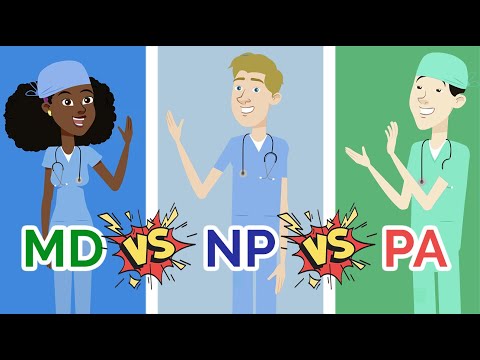Nurse Practitioner vs Medical Assistant: Which is Right for You?
Contents
- What is the difference between a nurse practitioner and a medical assistant?
- The roles of a nurse practitioner vs a medical assistant
- The education and training required for a nurse practitioner vs a medical assistant
- The salary and job outlook for a nurse practitioner vs a medical assistant
- The work hours and working conditions for a nurse practitioner vs a medical assistant.
- The benefits and drawbacks of being a nurse practitioner vs a medical assistant.
- The best places to work as a nurse practitioner vs a medical assistant.
- The future of the nurse practitioner vs medical assistant profession.
- 10 things you didn’t know about nurse practitioners vs medical assistants.
- 5 famous nurse practitioners and medical assistants.
Considering a career in healthcare? Not sure if you should become a nurse practitioner or medical assistant? This blog post will help you make the decision that’s right for you!
Checkout this video:
What is the difference between a nurse practitioner and a medical assistant?
There are a number of different types of healthcare providers, each with their own set of skills, training, and responsibilities. Two of the most common types of providers are nurse practitioners (NPs) and Medical assistants (MAs). But what is the difference between these two roles?
Nurse practitioners are licensed healthcare professionals who have completed graduate-level education and training in nursing. NPs are able to provide a wide range of primary and specialty care services, including diagnose and treat illnesses, order and interpret diagnostic tests, prescribe medications, and provide guidance on preventative care. In some states, NPs may also have the authority to perform certain procedures, such as suturing a wound or performing a minor surgery.
Medical assistants, on the other hand, are unlicensed support staff who work under the supervision of licensed physicians or NPs. MAs typically have received formal training from an accredited program, but their education and training is not as extensive as that of an NP. As a result, Medical Assistants are generally not authorized to perform diagnostic or therapeutic tasks independently. Rather, their roles tend to be more administrative in nature, such as scheduling appointments or handling insurance paperwork. They may also assist with basic patient care tasks such as taking vital signs or drawing blood.
So which type of provider is right for you? If you are seeking comprehensive primary or specialty care services from a licensed healthcare professional, then you will need to see an NP. If you require only basic administrative support or assistance with routine patient care tasks, then an MA may be sufficient.
The roles of a nurse practitioner vs a medical assistant
There are many similarities between nurse practitioners (NPs) and medical assistants (MAs), but there are also some important differences. Both NPs and MAs provide patient care, but NPs have a more advanced scope of practice and can provide a wider range of services. Here’s a closer look at the roles of NPs and MAs so you can decide which is right for you.
Nurse practitioners are registered nurses (RNs) who have completed advanced coursework and training. They are licensed to practice independently in many states, although they may work under the supervision of a physician in some settings. NPs can provide a wide range of services, including performing physical exams, ordering and interpreting diagnostic tests, prescribing medications, and counseling patients on health and wellness.
Medical assistants are not licensed health care providers. They typically have completing a postsecondary certificate or diploma program, although some may have an associate degree. MAs typically work under the supervision of a physician or other health care provider. Their duties may include taking medical histories, recording patient vital signs, preparing patients for examination, assisting with diagnostic tests, providing treatments and procedures, and scheduling follow-up appointments.
So which is right for you? If you’re interested in providing direct patient care but don’t want to complete the lengthy education required to become a physician, NP or MA may be a good fit for you. Both NPs and MAs play important roles in the health care team and can make a difference in the lives of their patients.
The education and training required for a nurse practitioner vs a medical assistant
Nurse practitioners (NPs) are registered nurses who have completed advanced education and training in a specialty area of healthcare. NPs must complete a Master of Science in Nursing (MSN) or a Doctor of Nursing Practice (DNP) degree from an accredited nursing program, as well as pass a national certification exam.
Medical assistants (MAs) are healthcare professionals who provide basic patient care and administrative support to physicians and other healthcare providers. MAs typically have an associate degree or certificate from an accredited medical assisting program. Some states also require MAs to be licensed or certified.
The salary and job outlook for a nurse practitioner vs a medical assistant
The salary and job outlook for a nurse practitioner vs a medical assistant
Nurse practitioners (NPs) are advanced practice registered nurses who are educated and trained to provide a wide range of medical services, including diagnosing and treating illness, ordering and interpret diagnostic tests, and prescribing medications. They must have a Master’s degree in nursing (MSN) or a Doctor of Nursing Practice (DNP) degree.
Medical assistants (MAs) are health care professionals who provide support to physicians and other health care providers in hospitals, clinics, and other medical settings. They typically have an Associate’s degree or certificate from an accredited program.
Both NPs and MAs are in high demand and enjoy good job prospects. According to the Bureau of Labor Statistics, employment of NPs is projected to grow by 36 percent from 2018 to 2028, much faster than the average for all occupations. Employment of MAs is projected to grow by 23 percent from 2018 to 2028, also much faster than the average for all occupations.
NPs earn a median annual salary of $110,930, while MAs earn a median annual salary of $34,800.
The work hours and working conditions for a nurse practitioner vs a medical assistant.
When choosing a career in the medical field, it is important to consider the work hours and working conditions that will be most comfortable for you. For example, nurse practitioners typically work longer hours than medical assistants, but they also enjoy more independence and a higher level of responsibility. Medical assistants, on the other hand, typically have more regular hours and may find their work less stressful.
Nurse practitioners often work in hospitals or clinics, where they are responsible for caring for patients with a variety of medical conditions. They may also work in private practices, where they may see fewer patients but have more autonomy. Medical assistants typically work in doctors’ offices, assisting with patient care and administrative tasks.
Both nurse practitioners and medical assistants must be able to handle stress and difficult situations. However, nurse practitioners may find their work more stressful due to the longer hours and higher level of responsibility.Medical assistants typically have more regular hours and may find their work less stressful.
The benefits and drawbacks of being a nurse practitioner vs a medical assistant.
There are many similarities between nurse practitioners (NPs) and medical assistants (MAs), such as the fact that they are both in high demand and enjoy competitive salaries. However, there are also several important differences between the two professions that prospective students should take into account before making a decision about which path to pursue.
One of the biggest differences between NPs and MAs is the scope of practice. NPs are licensed to diagnose and treat patients independently, whereas MAs work under the supervision of a licensed physician. NPs also have more educational requirements, as they must complete a master’s or doctorate degree in nursing, whereas MAs can typically enter the workforce after completing a certificate or associate’s degree program.
another key distinction is that NPs typically have more responsibilities than MAs. In addition to providing direct patient care, NPs often serve as primary care providers, meaning that they coordinate all aspects of their patients’ care. They may also teach classes or provide continuing education to other health care professionals, conduct research, and serve on committees or boards.
Both NPs and MAs enjoy good job security and competitive salaries, but NPs tend to earn higher wages overall. According to the Bureau of Labor Statistics (BLS), the median annual salary for nurse practitioners was $109,820 in 2019, while medical assistants earned a median salary of $34,800 during the same year.
Prospective students who are interested in becoming health care providers should weigh the benefits and drawbacks of each profession before making a decision about which path to pursue. Both NPs and MAs play vital roles in the health care system, but their duties and responsibilities differ significantly. Students should consider their personal goals and interests when choosing between these two rewarding career options.
The best places to work as a nurse practitioner vs a medical assistant.
There are many different types of healthcare providers, and each has their own strengths and weaknesses. Two of the most popular roles in healthcare are nurse practitioners (NPs) and medical assistants (MAs). Both NPs and MAs play vital roles in patient care, but there are some key differences between the two that you should be aware of before you decide which is right for you.
Nurse practitioners are registered nurses who have gone on to complete additional training in a specialty area of medicine. NPs are able to diagnose and treat medical conditions, order and interpret diagnostic tests, and prescribe medication. In some states, NPs may even be able to open their own practices.
Medical assistants, on the other hand, are not registered nurses. They provide basic patient care services such as taking vital signs and measuring weight, but they do not have the same level of training as NPs. Medical assistants also typically work in doctor’s offices or clinics, rather than independently.
One of the biggest factors to consider when deciding between becoming an NP or an MA is your career goals. If you want to eventually open your own practice or have more autonomy in your work, then becoming an NP is the better option. However, if you’re more interested in working in a team environment and don’t mind having less responsibility, then working as an MA might be a better fit.
Another important factor to consider is salary. On average, NPs earn more money than MAs do. According to the Bureau of Labor Statistics, the median annual salary for nurse practitioners was $107,480 in 2018, while the median annual salary for medical assistants was $33,610. Of course, salary isn’t everything –– job satisfaction is also important –– but it’s something to keep in mind when making your decision.
ultimately, only you can decide whether becoming an NP or an MA is right for you. However, by taking the time to learn about the differences between these two roles, you can make a more informed decision about which career path is best for you.
The future of the nurse practitioner vs medical assistant profession.
With the ever-changing landscape of health care, it can be difficult to know which profession is right for you. If you’re interested in a career in health care, you may be wondering if you should become a nurse practitioner or medical assistant. Here’s a look at the future of both professions to help you make a decision.
The nurse practitioner vs medical assistant debate has been going on for years, and there doesn’t seem to be a clear winner. Both professions have their pros and cons, and it really depends on what you’re looking for in a career.
Nurse practitioners have been in high demand lately, due to the expansion of their scope of practice. Nurse practitioners are able to diagnose and treat patients independently, and can prescribe medication. They also have more opportunity to specialize in a certain area of medicine. However, nurse practitioners require more education than medical assistants, and their salaries are typically higher as well.
Medical assistants, on the other hand, are able to perform many of the same duties as nurses but do not require as much education. Medical assistants typically have an associate’s degree or certificate, while nurse practitioners must have at least a master’s degree. Medical assistants’ salaries are lower than nurse practitioners’, but they typically have more opportunity for upward mobility within their organizations.
So, which is right for you? If you’re interested in pursuing a career in health care but don’t want to commit to years of schooling, then medical assisting may be the right choice for you. However, if you’re looking for more independence and specialization opportunities, then becoming a nurse practitioner may be the better option.
10 things you didn’t know about nurse practitioners vs medical assistants.
Nurse practitioners (NP) and medical assistants (MA) are two of the most popular health care professions. both NPs and MAs provide vital services to patients, but there are some key differences between the two roles. Here are 10 things you may not know about nurse practitioners vs medical assistants:
1. Nurse practitioners are licensed health care providers who have completed additional training beyond registered nursing school. Medical assistants are not licensed health care providers.
2. Nurse practitioners can diagnose and treat medical conditions, order and interpret diagnostic tests, prescribe medications, and provide primary and specialty care. Medical assistants cannot diagnose or treat medical conditions, prescribe medications, or provide primary or specialty care.
3. Nurse practitioners must have a bachelor’s degree in nursing (BSN) or another related field before they can begin their NP training. Medical assistants do not need a BSN or any other related degree to begin working; they can receive on-the-job training or complete a certificate program.
4. Nurse practitioners must complete an accredited NP program before they can be certified and licensed to practice. Medical assistants do not need to complete an accredited program; they can be certified through various organizations such as the American Association of Medical Assistants (AAMA).
5. Nurse practitioners must pass a national certification exam before they can practice; medical assistants do not need to pass a national certification exam but may need to pass a state certification exam depending on the state in which they practice.
6. Nurse practitioners are required to complete continuing education courses throughout their careers to maintain their licenses; medical assistants are not required to complete continuing education courses but may need to do so to maintain their certifications through certain organizations such as the AAMA.
7. The median annual salary for nurse practitioners is $107,030; the median annual salary for medical assistants is $33,610.*
8. The job outlook for nurse practitioners is very good; the job outlook for medical assistants is good.* Nine percent growth is projected for nurse practitioner jobs from 2016-2026, while 29 percent growth is projected for medical assistant jobs during that same time period.*
So if you’re interested in pursuing a career in health care, both nurse practitioner and medical assistant roles can offer great opportunities! It’s important to research each profession carefully so that you can choose the one that best aligns with your interests, skills, and goals.*
5 famous nurse practitioners and medical assistants.
When it comes to choosing a healthcare career, there are many things to consider. Two of the most popular choices are becoming a nurse practitioner (NP) or a medical assistant (MA). Both roles are important in providing quality patient care, but they have different responsibilities. So, which is right for you?
Nurse practitioners are licensed clinicians who have completed graduate-level training beyond their registered nurse (RN) program. They must pass a national exam to earn their title, and they are allowed to prescribe medication and treat patients independently. NPs often specialize in areas such as family practice, pediatrics, or women’s health.
Medical assistants, on the other hand, are health professionals who perform both clinical and administrative tasks in physician’s offices, clinics, and hospitals. Although they do not need to be licensed, they must complete a formal education program and pass an exam to earn their certification. MAs typically work under the supervision of a physician or RN and perform tasks such as taking patient histories, measuring vital signs, drawing blood, and scheduling appointments.
Both NPs and MAs play an important role in providing quality patient care. If you are interested in a career in healthcare, weigh the pros and cons of each role to decide which is right for you.







